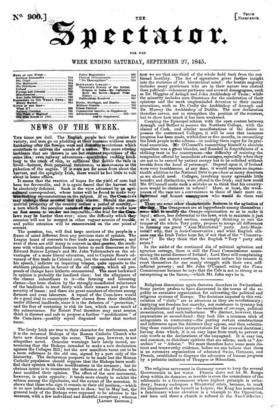The lively Irish are true to their character for restlessness,
and it is the reverend Bishops of the Roman Catholic Church who have now danced upon the scene. Their pas, however, is not altogether novel. Oracular warnings have lately issued, an- nouncing that the Bishops intended to make a new declaration against the Colleges Bill; but the new manifesto turns out to be a mere reference to the old one, signed by a part only of the hierarchy. The declaration purports to be made lest the Roman Catholic population should suppose that the Bishops have modi- fied their opinion with the modifications in the measure ; but its obvious intent is to counteract the influence of the Prelates who have modified their opinion. The effect of the new movement, however, is quite opposite : it tends more clearly to exhibit the schism among the dignitaries, and the extent of the secession. It shows that those who sign it remain in their old position,—which as no new information with respect to them: but in May last, the general body- of the Bishops were supposed to be adverse to the measure, with a few individual and doubtful exceptions ; whereas now we see that one-third of the whole hold back from the con tinned hostility. The list of signatures gives further insight into the statistics of the hierarchical mind : the hostile majority includes many gentlemen who are in their nature less clerical than political—vehement partisans and avowed demagogues, such as Dr. Higgins of Ardagh and John Archbishop of tun ; while the minority includes men illustrious for the moderation of their opinions and the meek singleminded devotion to- sacred avocations, such as Dr. Crolly the Archbishop of Armar,o-b. and Dr. Murray the Archbishop of Dublin. The new declaration therefore serves, not to strengthen the position of the resisters, but to show how much it has been weakened.
Coupling the Episcopal schism with the open contest between Armagh and Belfast to possess the Northern College, with the claims of Cork, and similar manifestations of the desire to possess the contemned Colleges, it will be seen that immense progress has been made, within four or five months, in reconciling the Irish people to the scheme—in making them eager for its prac- tical execution. Mr O'Connell's committing himself to absolute opposition was a great blunder, and founded in forgetfulness of A striking trait in his countrymen—the difficulty of resisting. the temptation offered by immediate advantages, especially when they are not to be earned by patient energy but to be solicited without trouble from the hand of patronage. Depend upon it, if Ireland were very troublesome, at any time, it would require no imprac- ticable addition to the National Debt to purchase as many deserters as we should need. Colleges, involving many agreeable little benefits and distinctions, were offered to the Irish; and how could Mr. O'Connell make such a mistake as to think that his country- men would be obstinate in refusal ? Here, at least, the weak- nessee of the race are a convenience to those of their more en- lightened and honest countrymen who would do them real good. There are some other characteristic features in the agitation of the-day. The Orangcmen are at loggerheads among themselves : "rule wish to modify the Orange organization so as to make it legal ; ethers, less deferential to the laws, wish to maintain it just as it is; and -a third section, cunningly thinking to suit the temper of the whole Tory party, propose to merge all differences in forming one great " Anti-Ministerial " party. Anti-Minis- terial! why, that is Anti-Conservative ; and what English alli- ance can the Irish Tories hope for, if not that of the " Conserva-
tives " Do they think that the English " Tory " party still exists ?
In the midst of the continued din of political agitation and agrarian outrage; there is still the Times Commissioner anato- mizing the social diseases of Ireland ; Lord Erne still complaining that; with the utmost exertions, he cannot induce his tenants to exert themselves for one manly struggle with their own self- inflicted poverty ; and Mr. John O'Connell rating the Times Commissioner because he says that the" Celt is not so strong or so enterprising as the Saxon,—which Mr. John says he is.


































